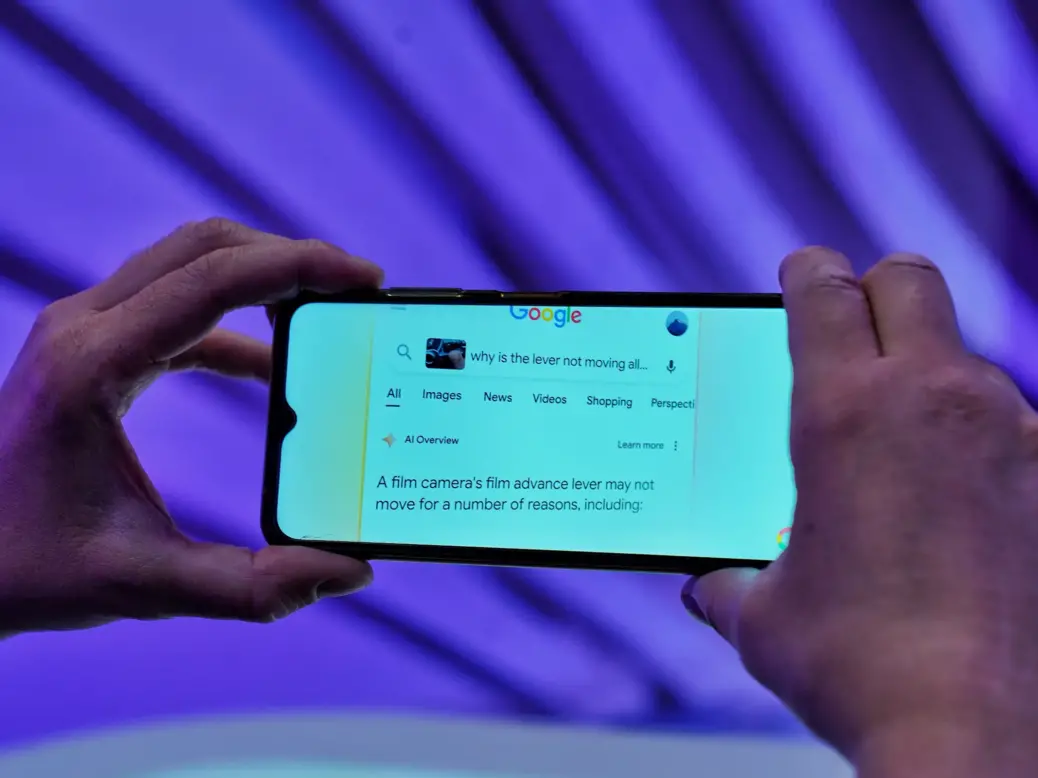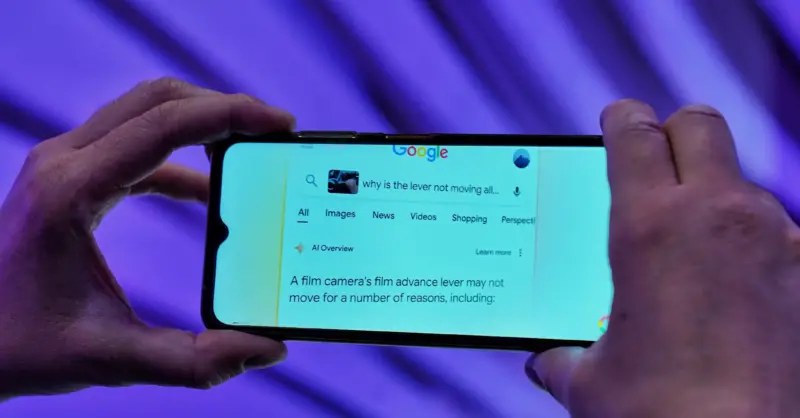
Mail Online is among the most-impacted major newsbrands by the arrival of Google’s AI Overviews, according to Press Gazette analysis of new Similarweb data.
Of the top 100 search keywords driving traffic to dailymail.co.uk (which redirects to a .com URL in certain countries), 32 triggered AI Overviews in May 2025.
In 68.8% of searches for these keywords where an AI Overview was present in May, no click was made by the user to go to the site (compared with 54.9% of searches not driving a click overall when looking at the site’s top-100 search terms).
It was a similar story in April (69.2% of zero clicks for AI Overviews keywords versus 56.1% overall) and March (71.3% with an AI Overview and 56% overall).
In May 2024, when AI Overviews was widely launched in the US mid-month, Mail Online had a zero-click search rate of 48% – indicating there has been a huge increase since the feature arrived.
The latest Similarweb data shared with Press Gazette looks at the 100 biggest websites in its news and media category, the top 100 search keywords for each and how many of those triggered an AI Overview.
It then compared the average occurrence of zero-click searches where an AI Overview Google summary of the article was present versus the overall rate of zero-click searches.
[Read more: Google AI Overviews leads to dramatic reduction in clickthroughs for Mail Online]
Also seeing a high proportion of their 100 top keywords showing an AI Overview in May were People.com (40) and Buzzfeed (36).
At People, in 71.2% of searches that brought up an AI Overview, no click was made to the site.
Overall People.com saw zero-click searches in 65.6% of cases. This remains similar to May 2024 when it had a zero-click search rate of 66.2%.
Meanwhile, Buzzfeed has gone from 52.8% zero-click searches in May 2024 to 60.7% overall and 69.2% where an AI Overview is present in May this year.
The biggest change was at French daily newspaper brand Ouest France, which saw 39.8% of searches result in zero clicks in May 2024 rising to 54.5% a year later (a 14.7 percentage point rise).
Just behind was MSN.com, which saw its overall zero-click search rate rise from 42.4% to 56.1%, a 13.8 percentage point rise.
The highest zero-click rate when AI Overviews appeared in May was at Japanese newsbrand Livedoor (79.5%) followed by Russia’s Komsomolskaya Pravda (79%), and American broadcaster CBS News (75.1%)
Not all of the top 100 news and media brands saw an increase: a quarter saw their overall zero-click searches decrease in the past year (even if some of their search terms were impacted by AI Overviews).
And just over a third (35) actually saw fewer zero-click searches when an AI Overview was present compared to their overall figure for May.
Four did not have any AI Overviews show up for their top search terms.
Outside of solely looking at the top-100 dataset, Similarweb has found that zero-click news searches in Google increased from 56% when AI Overviews were first launched in May 2024 to almost 69% in May this year.
The fact that the dramatic increase in zero-click searches was less marked when looking only at the top 100 news websites globally and in the US could suggest that people are more likely to click through to well-known brands that they know and trust.
“During the same period, organic traffic to news publishers has declined noticeably, dropping from over 2.3 billion visits at its peak to under 1.7 billion,” a report sharing some of the data findings said.
“The inverse relationship suggests that users are increasingly getting answers directly on the results page, without clicking through to publishers.
“For news organisations, this shift marks a critical inflection point: visibility alone may no longer translate into traffic, challenging long-standing assumptions about the value of ranking in search.”
A legal complaint was lodged with the Competition and Markets Authority in the UK last week urging the regulator to take “urgent” action stopping Google from stealing publisher content for AI Overviews, saying it is affecting traffic, audience and revenue and that the tech giant has not given them a genuine choice over the ability to opt out.
Websites that choose to opt out of Google’s AI scraping must also opt out of being shown in search results, unless they choose to be shown in only the less attractive “no snippet” format that shows users less information.
A Google spokesperson said last week: “More than any other company, Google prioritises sending traffic to the web, and we send billions of clicks to websites each day.
“New AI experiences in Search enable people to ask even more questions, which creates new opportunities for content and businesses to be discovered. Publishers have control over what content appears in Search, which includes AI Overviews.”
US: Yahoo News and Politico among highest zero-click rates for AI Overviews
Looking at the US, zero-click searches among the top 100 news and media websites were up from 52.8% to 55.2% according to Similarweb.
Among those with the highest proportion of AI Overviews showing against their top 100 keywords in May were Us Weekly with 40 AI-generated summaries appearing, Mail Online (known as Daily Mail in the US) with 39 appearing, Buzzfeed (36), Athlon Sports (34), People (32), Men’s Journal (31), Hello! Magazine (31) and the Mirror US (30).
The highest zero-click rates when AI Overviews appeared in May among the top brands in the US included The Gateway Pundit (88.3%, but only with one AI keyword), Yahoo News (78%), Trump forum Patriots.win (77.9%, also with only one AI keyword), Science Alert (77.3%), Upworthy (77.2%) and Politico (77.1%).
Several of these publishers also saw the biggest disparities between their zero-click searches with AI Overviews and their overall zero-click searches in May: Yahoo News (78% zero-click searches with AI Overviews versus 51% overall), Politico (77.1% with versus 56.3% overall) and Science Alert (77.3% with and 48.6% overall).
The publisher with the greatest change in zero clicks between May 2024 and 2025 was home improvement and gardening brand the Farmingdale Observer, rising from 40.9% overall zero-click searches in May 2024 to 71.7% in May 2025 (a 30.8 percentage point rise).
In terms of dedicated newsrooms, The Independent’s US website was worst-hit by this metric, going from 52.4% zero clicks to 63.6% – an 11.2 percentage point rise.
The New York Times had a much lower proportion of zero-click searches when AI Overviews showed (25.2%) compared to its overall figure (40.1%) – although just six of its top 100 keywords showed one of the AI summaries.
This could mean that people were more likely to click through to learn more from the title when an AI Overview was present, although it is a small sample size.
Google has said it does not trigger AI Overviews for hard news queries, meaning media brands with a greater reliance on lifestyle and evergreen content are more likely to be pushed down search results pages by the feature.
Overall in the US seven of the top 100 sites saw fewer zero-click searches when AI Overviews were present than their overall figure.
Meanwhile nine, including Yahoo Finance, Breitbart and Raw Story, did not have any AI Overviews triggered against their top search terms.
ChatGPT ‘surges’ for news as Google ‘stalls’
Although ChatGPT referrals to news publishers remain a fraction of those sent from Google, Similarweb data also noted that the OpenAI platform is still in a huge growth phase while Google is stagnating.
Similarweb’s report on the impact of generative AI on publishers found that news-related queries on ChatGPT had risen by 212% between January 2024 and May 2025 while equivalent Google searches were down by 5%.
It said: “A significant divergence started in late 2024, with ChatGPT usage accelerating sharply from January 2025 onward. This suggests users are increasingly turning to generative AI for real-time news insights.
“Meanwhile, Google’s flat-to-declining trend highlights shifting user preferences and the growing role of AI assistants in information retrieval.”
In May, ChatGPT had 60.2 million unique users on web while its app had 46.6 million active users.
In the past six months, its app users more than doubled (up 116%) compared to the same period the year before, while its web visitors were up by 52% year on year.
Similarweb data also showed what news topics are getting the most engagement on ChatGPT with real-time financial and markets updates leading the way.
This may explain why Reuters, Business Insider, the Wall Street Journal and Forbes are among the top seven sites in the US when ranked by traffic received from ChatGPT.
Email pged@pressgazette.co.uk to point out mistakes, provide story tips or send in a letter for publication on our “Letters Page” blog

